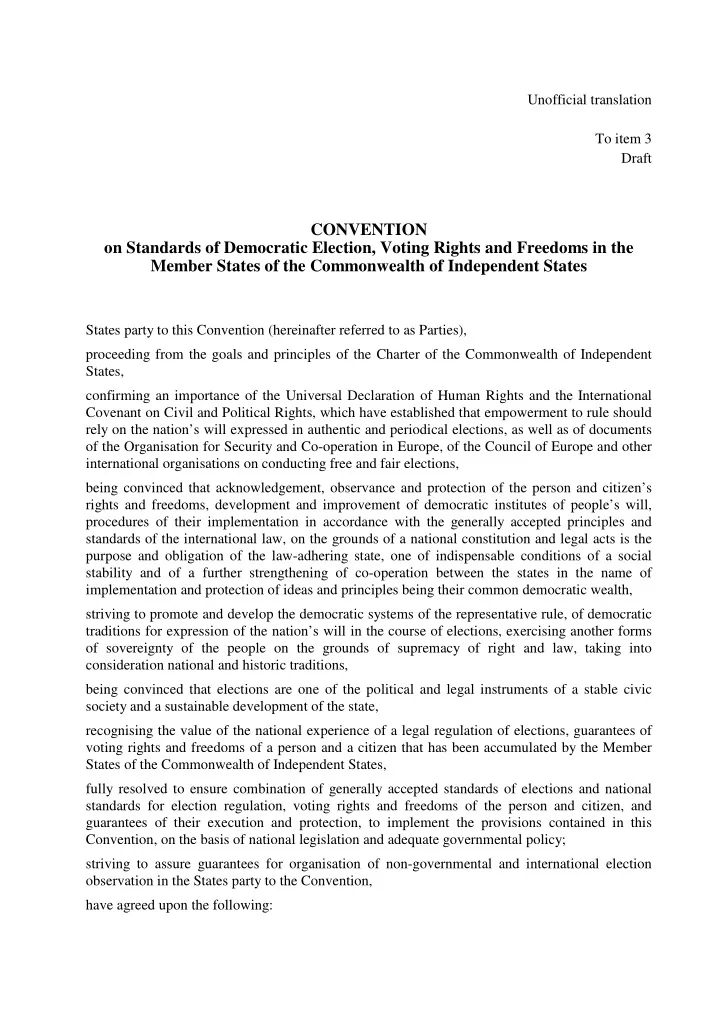

Unofficial translation To item 3 Draft CONVENTION on Standards of Democratic Election, Voting Rights and Freedoms in the Member States of the Commonwealth of Independent States States party to this Convention (hereinafter referred to as Parties), proceeding from the goals and principles of the Charter of the Commonwealth of Independent States, confirming an importance of the Universal Declaration of Human Rights and the International Covenant on Civil and Political Rights, which have established that empowerment to rule should rely on the nation’s will expressed in authentic and periodical elections, as well as of documents of the Organisation for Security and Co-operation in Europe, of the Council of Europe and other international organisations on conducting free and fair elections, being convinced that acknowledgement, observance and protection of the person and citizen’s rights and freedoms, development and improvement of democratic institutes of people’s will, procedures of their implementation in accordance with the generally accepted principles and standards of the international law, on the grounds of a national constitution and legal acts is the purpose and obligation of the law-adhering state, one of indispensable conditions of a social stability and of a further strengthening of co-operation between the states in the name of implementation and protection of ideas and principles being their common democratic wealth, striving to promote and develop the democratic systems of the representative rule, of democratic traditions for expression of the nation’s will in the course of elections, exercising another forms of sovereignty of the people on the grounds of supremacy of right and law, taking into consideration national and historic traditions, being convinced that elections are one of the political and legal instruments of a stable civic society and a sustainable development of the state, recognising the value of the national experience of a legal regulation of elections, guarantees of voting rights and freedoms of a person and a citizen that has been accumulated by the Member States of the Commonwealth of Independent States, fully resolved to ensure combination of generally accepted standards of elections and national standards for election regulation, voting rights and freedoms of the person and citizen, and guarantees of their execution and protection, to implement the provisions contained in this Convention, on the basis of national legislation and adequate governmental policy; striving to assure guarantees for organisation of non-governmental and international election observation in the States party to the Convention, have agreed upon the following:
2 Article 1 Standards of Democratic Elections 1. The Parties hereto proceed from the assumption that elections are one of the utmost direct expressions of the nation’s power and will, freely expressed in democratic elections, are the basis of elective bodies of governmental power and local self-government, of other bodies of people’s (national) representation, of legitimacy of bodies being elected, elective officials. 2. The Parties hereto acknowledge that standards of democratic elections are the citizen’s right, secured in the Constitution or in the other basic laws of the state, to elect and being elected to the bodies of state power, self-governmental bodies, to other bodies of peoples (national) representation, principles of periodicity and an obligatory nature, fairness, authenticity and freedom of elections on the basis of universal, equal and direct suffrage with a secret balloting, providing for freedom of expression of voters’ will, an open and transparent nature of elections, exercise of judicial and other protection for voting rights and freedoms of the person and citizen, national and international observation of elections, guarantees for realisation of voting rights and freedoms of the election process participants. 3. The citizen’s right to elect and being elected should be fixed in the Constitution and/or in the laws. Its execution should be determined by laws and other legal acts. Legislative regulation of the right to elect and to be elected, of the elections (election systems) as well as limitations of the citizens’ voting rights and freedoms should not contradict the generally accepted principles and standards of the international law, constrain or revoke the generally accepted rights and freedoms of the person and citizen, and the constitutional and/or legislative guarantees of their implementation, as well as have a discriminative nature. 4. Calling on, preparation and conducting of elections should be accomplished on the grounds of Constitution, laws. 5. Elected people won a necessary number of votes, determined by the Constitution, law, shall assume their office in line with the procedures and the terms stipulated by the laws, and thus they take their responsibility before voters and remain in their office till expiration of the term of their powers or till their termination in another way that is regulated by the Constitution, laws in accordance with democratic parliamentary and constitutional procedures. 6. The constitutional, civil, administrative and criminal laws should ensure a legitimate and public nature of elections, protection and implementation of voting rights and freedoms of citizens, of candidates, political parties (coalitions), taking part in elections, realisation of the constitutional principles in organisation if elections the law application practice. 7. Any direct or indirect participation of foreign citizens, persons without citizenship, foreign legal entities, international non-government movements in activities providing for or preventing from preparation and conducting of elections to the bodies of state power and local self-governments, to other bodies of peoples’ (national) representation in the Member States of this Convention is not allowed. Article 2 Universal Suffrage The Parties hereto proceed from the assumption that observance of the principle of universal suffrage means: a) every citizen, upon coming up to the age fixed by the Constitution, laws, has the right to elect and to be elected to the bodies of state power, to local self-governments, other bodies of people’s (national) representation, to elective posts on the conditions and in the course stipulated by the Constitution and laws;
Recommend
More recommend